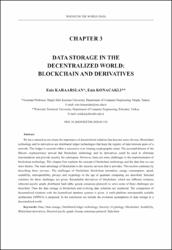Data Storage in the Decentralized World: Blockchain and Derivatives
Künye
Karaarslan, E., and Konacıklı Enis. (2020). Data Storage in the Decentralized World: Blockchain and Derivatives. In S. Prof. Gülseven, E. Res. Asist. Akadal, & S. Prof. Kumar Sharma (Eds.), Who Runs the World: Data (pp. 37-69). Retrieved from https://iupress.istanbul.edu.tr/tr/book/who-runs-the-world-data/homeÖzet
We have entered an era where the importance of decentralized solutions has become more obvious. Blockchain technology and its derivatives are distributed ledger technologies that keep the registry of data between peers of a network. This ledger is secured within a successive over looping cryptographic chain. The accomplishment of the Bitcoin cryptocurrency proved that blockchain technology and its derivatives could be used to eliminate intermediaries and provide security for cyberspace. However, there are some challenges in the implementation of blockchain technology. This chapter first explains the concept of blockchain technology and the data that we can store therein. The main advantage of blockchain is the security services that it provides. This section continues by describing these services.. The challenges of blockchain; blockchain anomalies, energy consumption, speed, scalability, interoperability, privacy and cryptology in the age of quantum computing are described. Selected solutions for these challenges are given. Remarkable derivatives of blockchain, which use different solutions (directed acyclic graph, distributed hash table, gossip consensus protocol) to solve some of these challenges are described. Then the data storage in blockchain and evolving data solutions are explained. The comparison of decentralized solutions with the lcentralized database systems is given. A multi-platform interoperable scalable architecture (MPISA) is proposed. In the conclusion we include the evolution assumptions of data storage in a decentralized world
Kaynak
Who Runs the World: DataBağlantı
https://cdn.istanbul.edu.tr/file/JTA6CLJ8T5/33C1D17251B6449890C3CE4D5E756C0Chttps://hdl.handle.net/20.500.12809/8860


















